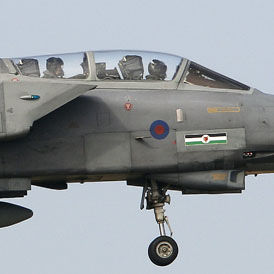 Paris, April 26: The global economic crisis and the subsequent drop in defence budget allocations forced the European Union to heavily depend on American assets for defence operational needs.
Paris, April 26: The global economic crisis and the subsequent drop in defence budget allocations forced the European Union to heavily depend on American assets for defence operational needs.
The EU's operational limitations and overdependence on US assets were exposed during last year operations in Libya and even on earlier occasions in Kosovo.
“The operations over Libya was a wake-up call for the EU nations which set the alarm bells ringing,” says European Defence Agency communication head Eric Platteau. The Americans, during the Libya campaign, told EU nations in no uncertain terms not to bank on its assets all the time, he added.
EU's Air-to-Air Refueling capacity was no match to the US assets. The European Defence Agency in its recent internal report has even admitted that the “Europeans cannot even sustain a mid-size air operation at this time.” Eric Platteau explains how Europe can field just 42 aircraft of ten different types as compared to US resources of a whopping 650 aircraft of four different types.
This major shortfall in European Union defence capability has left Europeans with some serious mulling over polling and sharing of its defence assets.
The idea is to put in place a systematic European approach that builds up joint defence capabilities that can be used by EU and Nato. But the constrains cannot be overlooked. In the two years, from 2008 to 2010, following the economic crisis, the overall defence expenditure of the 26 European Defence Agencies (EDA) participating member states has decreased by almost 5 per cent. In 2009, the fall in defence budget was estimated at 3.7 per cent.
The Europeans have already begun work on enhancing air-to-air refueling capabilities. The EDA is underway with its efforts to facilitate and harmonise the acquisition of additional air-to-air capabilities.
“We are creating all possible synergies in the logistics, training and operational functions. We are also working on to increase the number of contributing member states by polling and sharing air-to-air assets and services,” Eric told Indian journalists in Brussels.
He added that the mandate by the ministers of defence is to develop this capability on priority and make this available for potential use on EU, Nato and other operations.
Another area of utmost concern for the EU is its relative weakness of the indigenous European Intelligence Surveillance and Reconnaissance (ISR) which was at the fore during the Libya campaign.
Eric maintains that all operational, legal and humanitarian aspects of current and future operations will require even greater precision. “Greater ISR is the key. The way forward is to add-on capacities in sensors, networks. Standardising image formats and network architectures are issues that are being looked into,” he said.
The EU's polling and sharing model is being applies to its Helicopter Training Programme as well. The EDA is also planning to organise two military exercises in 2012 — Hot Blade 12 which is being hosted by Portugal and Green Blade 12 which is hosted by Belgium.






Comments
Add new comment